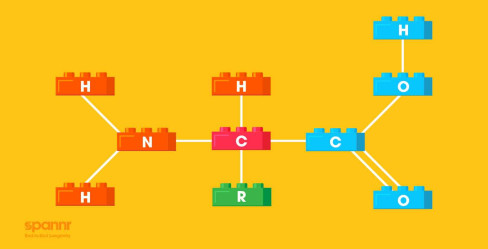Peptide Therapy for Longevity - All You Need to Know

Lately, I’ve been noticing advertisements all over the place for peptide therapy. Injections, pills, creams, and all sorts of different ways to get your peptides.
Maybe it’s because I’m getting older and I’m being targeted by advertisers who think I am their key customer?
Before writing this article, the only thing I knew about this topic was based on the collagen peptides that I mix into my coffee every morning. Supposedly, that stuff is good for your joints and skin.
But after seeing many longevity clinics advertise their peptide therapy services, I thought it’d be a good idea to do a deep dive on the topic.
Below, you’ll find all of the research that I did based on the questions that I wanted to know. I also looked into many of the most popular peptides and made a list at the end for you to review. Let’s dive in…
What are peptides?
Peptides are short chains of amino acids, which are the building blocks of proteins, and play crucial roles in biological processes throughout the body. They are smaller than proteins, consisting of between 2 and 50 amino acids. Proteins are made up of longer chains of amino acids.
Peptides can be classified based on their structure and function. Some serve as hormones, neurotransmitters, or signaling molecules, while others act as enzymes, antimicrobial agents, or components of the immune system. Their diverse roles make peptides essential for maintaining health and regulating bodily functions.
One well-known example of a peptide hormone is insulin, which regulates blood sugar levels by facilitating the uptake of glucose into cells. Another example is oxytocin, often referred to as the "love hormone," which plays a role in social bonding, childbirth, and lactation.
Benefits of peptide therapy
In addition to their natural roles in the body, peptides have recently gained attention for their potential therapeutic applications.
Synthetic peptides can be designed to mimic the function of naturally occurring peptides or to target specific receptors or pathways in the body. This has led to the development of peptide-based drugs for various medical conditions, including cancer, diabetes, infectious diseases, and autoimmune disorders.
Peptides are also of interest in the field of cosmetics, anti-aging, and skincare. They are used in formulations to promote collagen synthesis, improve skin elasticity, and reduce the appearance of wrinkles.
Here are three of the most popular peptide therapy applications:
Longevity
Although many people look to peptide therapy for weight loss or muscle gain, a new trend is developing in the life extension crowd. Considering that physical health is a key component of living longer, it’s easy to understand why this therapy would be added to someone's longevity health regime.
Some peptides, such as sermorelin, act as growth hormone and can combat the body’s natural decline in production. With growth hormone peptides, biohackers and longevity seekers can benefit from improved sleep, reduced heart scarring, and prevent decline in neurological functions.
Weight Loss
Weight loss peptides have shown promise in clinical research and trials. They do this by influencing various physiological processes in the body, including metabolism, appetite regulation, and fat metabolism.
Some peptides have been developed specifically for their ability to aid in weight loss or fat reduction.
One example is peptide YY (PYY), a hormone released by the gastrointestinal tract in response to food intake. PYY has been found to reduce appetite and food intake, making it a potential target for weight loss therapies.
Similarly, glucagon-like peptide-1 (GLP-1) analogs have been developed as treatments for obesity and type 2 diabetes due to their ability to reduce appetite and promote feelings of fullness. There are several popular GLP-1 drugs on the market today such as Ozempic, Mounjaro, and Wegovy.
It's important to note that while peptides can be effective for weight loss, they are typically used as part of a comprehensive treatment plan that includes dietary changes, exercise, and lifestyle modifications.
Muscle Growth
Many peptides have been studied for their ability to stimulate muscle growth, increase strength, and enhance recovery after exercise.
Although peptides for bodybuilding have historically been the most popular, more athletes and longevity enthusiasts are looking at new options to build muscle. That’s because maintaining muscle strength is a key aspect of healthy aging.
One of the best peptides for muscle growth is growth hormone-releasing peptides (GHRPs), which stimulate the release of growth hormone from the pituitary gland.
GHRPs work by binding to specific receptors on cells in the pituitary gland, triggering the release of growth hormone into the bloodstream. Growth hormone plays a crucial role in promoting muscle growth, protein synthesis, and tissue repair.
Another peptide commonly used for muscle growth is the synthetic peptide known as BPC-157 (Body Protection Compound-157). BPC-157 has been shown to promote muscle regeneration and repair, reduce inflammation, and improve recovery from injuries.
As with weight loss, using peptides to support muscle growth and improve athletic performance should only be used under the guidance of a healthcare professional. Additionally, athletes should be aware of regulations regarding the use of peptides in sports, as many are prohibited by athletic organizations due to their performance-enhancing effects.
Is peptide therapy legal?
Of all the research I did, the legal aspects are perhaps the most confusing. The short answer to whether peptides are legal is: you may need a prescription from a licensed healthcare professional.
Now, the longer answer is that there is an enormous gray area. This is because there are literally thousands of different peptides. Some are naturally occurring and some are synthetically formulated.
Because of the nearly infinite number of possible scenarios, where a certain peptide can be used for a certain health condition for a certain individual, it’s almost impossible to come up with a clear legal framework.
That’s why the FDA has been constantly issuing guidance changes as to the legal categories of peptides. Their most recent change came in late 2023, which you can view here.
In summary, in order to ensure you are using peptides legally, always consult with a board-certified healthcare professional.
How do you take peptides?
Methods can vary depending on the specific peptide and its intended use. Here are some common form factors and administration methods:
- Oral Administration: Some can be taken orally in the form of capsules or tablets. However, peptides taken orally may be broken down by digestive enzymes before they can be absorbed into the bloodstream, reducing their effectiveness.
- Subcutaneous Injection: Subcutaneous peptide injections are administered into the fatty tissue just beneath the skin using a small needle. This method allows for absorption directly into the bloodstream, bypassing the digestive system and potentially increasing its effectiveness.
- Intramuscular Injection: Intramuscular (IM) injection involves injecting peptides into a muscle using a needle and syringe. This method also allows for direct absorption into the bloodstream and is often preferred for many peptide therapies.
- Nasal Spray: Some can be administered as nasal sprays, which are sprayed into the nostrils and absorbed through the nasal mucosa. Nasal sprays offer a non-invasive alternative to injections and may be more convenient for some individuals.
- Topical Application: Certain peptides, particularly those used in skincare or cosmetic products, can be applied topically to the skin. Topical application allows the peptide to be absorbed directly through the skin and into the underlying tissues.
- Intravenous Infusion: In some cases, peptides may be administered intravenously (IV) through a vein, typically in a clinical setting under the supervision of a healthcare professional. IV infusion allows for rapid delivery of the peptide into the bloodstream and may be used for certain medical treatments or research purposes.
It's important to note that the specific method of administration for a peptide will depend on factors such as its intended use, formulation, and the individual's medical condition. Before taking any peptide-based medication or therapy, it's essential to consult with a healthcare professional.
Where can I find peptide therapy near me?
Because almost all peptides require a prescription from a doctor, you’ll need to visit a licensed medical professional.
Most preventative care specialists, or longevity doctors, should be able to provide you a prescription for peptide therapy. This would include the specific peptide type, dosage, method of delivery, and any other pertinent information based on your personal medical history.
Additionally, most longevity clinics can provide peptide therapy within their facility. Depending on your regiment, therapy could be administered once or on a scheduled on-going basis.
You can use Spannr’s marketplace to find peptide therapy near you.
Where can I buy peptides?
Peptides for sale are available from various sources, including pharmacies, compounding pharmacies, research chemical suppliers, online retailers, and specialized peptide manufacturers.
However, it's important to exercise caution when you buy peptides, as quality and safety can vary among suppliers. Furthermore, you should only purchase peptides that are legal and you have a prescription for.
Here are some options for buying peptides:
- Pharmacies: Some peptides, particularly those that are approved for medical use, may be available from traditional pharmacies with a prescription from a healthcare provider.
- Compounding Pharmacies: Compounding pharmacies specialize in creating customized medications, including peptides, based on individual patient needs and prescriptions from healthcare providers.
- Online Retailers: You can buy peptides online, but you should make sure to research the reputation and credibility of these suppliers.
- Specialized Peptide Manufacturers: Some companies specialize in manufacturing and selling peptides for research purposes, pharmaceutical development, and other applications. These companies may offer a wide range of products and services, including custom synthetic peptides.
When purchasing peptides, it's crucial to consider the following factors:
- Quality Assurance: Look for suppliers that adhere to strict quality control standards and have established procedures for ensuring the purity, potency, and safety of their products.
- Regulatory Compliance: Ensure your purchases comply with applicable regulations and guidelines.
- Customer Reviews and Feedback: Research customer reviews and feedback to gauge the reputation and reliability of the supplier. Look for testimonials from other customers regarding product quality, shipping times, customer service, and overall satisfaction.
- Consultation with Healthcare Professionals: If purchasing for medical purposes, consult with a healthcare professional to determine the appropriate peptide, dosage, and administration method for your specific needs.
It's important to note that some peptides may be restricted or regulated in certain countries or regions, and their sale and use may be subject to specific laws and regulations. Always ensure compliance with local regulations and seek guidance from appropriate authorities if necessary.
What are the costs?
Peptide therapy costs can range from $50 up to $400, per dose. Depending on the type of peptide, the dosage, and your frequency of use, it’s possible to spend thousands of dollars per month for peptide therapy.
Most insurance does not cover this kind of therapy, so these costs will have to come out of your pocket. That said, some clinics can provide monthly subscription plans that significantly reduce total costs with the expectation that you are continually using the therapy.
What are the risks?
For healthy individuals without any major pre-existing health issues, peptide therapy is generally safe.
However, there are some serious risks that should not be dismissed. Mood swings, skin irritation, headaches, decreased sexual function, and many other adverse side effects are possible.
That’s why it’s absolutely essential that you consult with a board-certified physician before starting any type of peptide therapy.
Popular types of peptides
AOD 9604
Atraxi
Black Snail
BPC 157
Brain Natriuretic
Bronchogen
CJC-1295
Collagen “Collagen peptides”
DIHEXA
DSIP
GHK-Cu (copper peptides) “copper peptide serum”
Ipamorelin
Ibutamoren
KPV
LL-37
Marine Collagen
Melanotan II
MOTS-C
PT 141
PYY
Selank
Semax
Semaglutide
Sermorelin
Thymosin Beta 4
Thymosin Alpha I
Tirzepatide
About the Author
Sign Up For Our Newsletter
Weekly insights into the future of longevity
